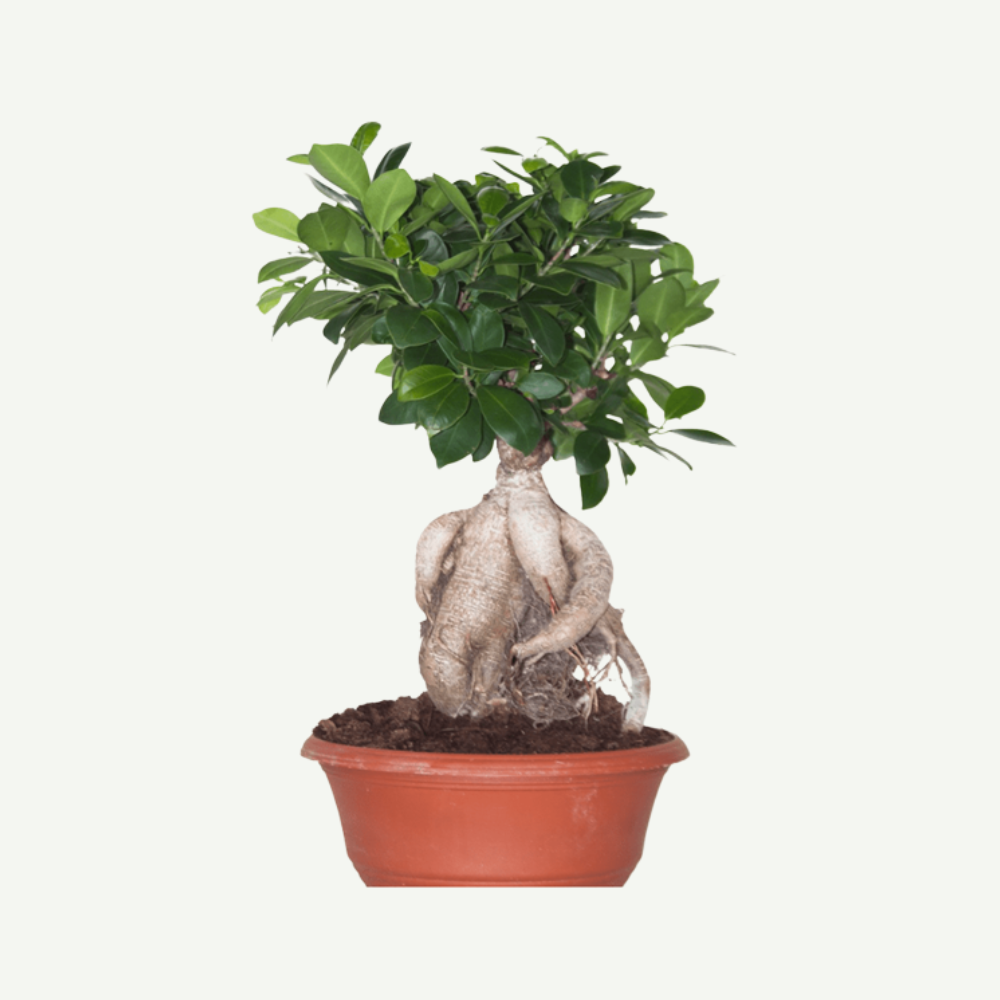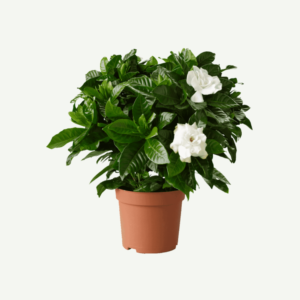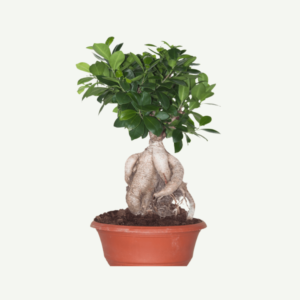Ficus microcarpa Bonsai, also known as Chinese Banyan or Indian Laurel, is a popular species used for bonsai cultivation. It belongs to the Moraceae family and is native to parts of Southeast Asia, India, and China. The Ficus microcarpa bonsai is valued for its small leaves, dense foliage, and the ability to develop aerial roots and a captivating root-over-rock structure, which adds to its artistic appeal
Care of Ficus microcarpa Bonsai:
Light Requirements: Place the Ficus microcarpa bonsai in a location with bright, indirect light. It thrives in well-lit areas but should be protected from intense, direct sunlight, which can scorch the leaves.
Temperature: Ficus microcarpa prefers temperatures between 60°F to 75°F (15°C to 24°C) and is sensitive to cold drafts. Protect it from temperatures below 50°F (10°C).
Watering: Check the soil regularly and water the bonsai when the top inch of the soil feels slightly dry. Water thoroughly until water drains from the bottom of the pot. Avoid overwatering, as it can lead to root rot.
Humidity: Ficus microcarpa bonsai appreciates higher humidity levels. Regular misting or placing a humidity tray nearby can help maintain adequate moisture.
Soil: Use well-draining bonsai soil with a mixture of organic and inorganic components.
Fertilizer: Feed the bonsai with a balanced, water-soluble bonsai fertilizer every 2-4 weeks during the growing season (spring and summer). Reduce or stop fertilizing in the winter when growth slows down.
Pruning and Training: Regular pruning is essential to maintain the desired shape and size of the bonsai. Ficus microcarpa can develop aerial roots, which can be trained over rocks or through wiring techniques to enhance its artistic appearance.
Repotting: Repot the bonsai every 1-2 years or when the root system becomes dense and starts circling the pot. Repot during the growing season and trim the roots as necessary.
Indoor vs. Outdoor: Ficus microcarpa bonsai can be grown indoors as a houseplant or outdoors in a mild and temperate climate. In colder regions, it is better to keep it as an indoor bonsai and provide winter protection.
Characteristics of Ficus microcarpa bonsai:
Appearance: Ficus microcarpa bonsai has small, oval-shaped, glossy green leaves that develop dense foliage. The tree can develop aerial roots, which can be trained over rocks or other surfaces to create a more mature and natural appearance.
Small Leaves: Ficus microcarpa bonsai are known for their small, glossy green leaves, which are well-proportioned to the size of the bonsai tree. The reduced leaf size is desirable in bonsai cultivation.
Aerial Roots: One of the distinctive features of Ficus microcarpa is its ability to produce aerial roots. In bonsai cultivation, these aerial roots can be manipulated and trained to enhance the visual appeal of the tree, contributing to a mature, aged appearance.
Trunk and Bark: Over time, Ficus microcarpa bonsai develop a thick and gnarled trunk with attractive bark patterns. This characteristic is highly valued in bonsai, as it contributes to the tree’s overall aesthetic.
Tolerance to Pruning: Ficus microcarpa can handle regular pruning and shaping, making it well-suited for bonsai. Pruning helps maintain the tree’s size and encourages the development of a compact and dense canopy.
Indoor and Outdoor Varieties: Ficus microcarpa bonsai can be grown both indoors and outdoors, depending on the climate. Indoor varieties should be placed in a well-lit location, while outdoor varieties can benefit from natural sunlight.
Fruit Production: In favorable conditions, Ficus microcarpa bonsai may produce small fig-like fruits. These fruits add to the tree’s charm but are generally not the primary focus of bonsai cultivation.
Container Size: The size of the bonsai pot or container should be selected in proportion to the size of the tree. Ficus microcarpa bonsai are typically placed in shallow containers to accentuate their overall appearance.
Soil and Watering: Well-draining bonsai soil is essential to prevent waterlogged roots. Ficus microcarpa bonsai prefer consistent watering but should be allowed to partially dry out between waterings.
Fertilization: Regular fertilization during the growing season helps promote healthy growth and development. Balanced, liquid bonsai fertilizers are commonly used.
Pest and Disease Resistance: Ficus microcarpa bonsai are generally hardy and resistant to many common bonsai pests and diseases. However, it’s important to monitor for issues and address them promptly.
Training and Wiring: Ficus microcarpa bonsai can be trained and wired to achieve desired shapes and styles, such as informal upright, slanting, or cascade. Wiring should be done carefully to avoid damaging the branches.
Repotting: Repotting is typically done every couple of years to refresh the soil and promote root health. It’s best performed during the spring, just before the growing season.
Ficus microcarpa bonsai are suitable for both beginners and experienced bonsai enthusiasts due to their forgiving nature and attractive characteristics. With proper care and maintenance, they can develop into stunning miniature trees with a mature and artistic appearance.
Landscape use of Ficus Microcarpa Bansai:
Accent Pieces: Place Ficus microcarpa bonsai in garden beds or along walkways as accent pieces. Their graceful and artistic forms can draw attention and create focal points within the landscape.
Container Gardens: Display Ficus microcarpa bonsai in decorative containers on patios, decks, or courtyard gardens. They can serve as eye-catching additions to your outdoor living spaces and contribute to the aesthetics of your container garden.
Japanese or Zen Gardens: Ficus microcarpa bonsai are a natural fit for Japanese or Zen-inspired garden designs. Their peaceful and meditative appearance can enhance the tranquility and serenity of these garden styles.
Rock Gardens: If you have a rock garden, Ficus microcarpa bonsai can be nestled among the rocks to create a harmonious blend of stone and plant elements. Their miniature size complements the overall scale of a rock garden.
Bonsai Displays: Create a dedicated area within your landscape for displaying multiple Ficus microcarpa bonsai. Arrange them in a visually pleasing manner, taking inspiration from traditional bonsai displays.
Educational Gardens: In botanical gardens, public parks, or educational institutions, Ficus microcarpa bonsai can be used to educate visitors about the art of bonsai cultivation. They can be part of a larger display showcasing the beauty and techniques of bonsai.
Indoor/Outdoor Transition Areas: Place Ficus microcarpa bonsai in covered outdoor spaces like verandas, courtyards, or under pergolas. This allows them to thrive in a sheltered environment while providing a bridge between indoor and outdoor living areas.
Formal Gardens: In formal garden settings, Ficus microcarpa bonsai can add a touch of artistry and sophistication. They can be placed in structured garden beds or aligned along paths.
When incorporating Ficus microcarpa bonsai into your landscape design, consider the overall theme and style of your garden, as well as the local climate. These bonsai are best suited for regions with a mild or tropical climate, and they should be protected from frost and extreme cold. Additionally, ensure that the planting area or container has well-draining soil to promote healthy root growth.
Proper care, including regular watering, humidity maintenance, and protection from pests, is essential to keep your Ficus microcarpa bonsai looking their best in a landscape setting. With the right conditions and thoughtful placement, they can add a touch of artistry and sophistication to your outdoor spaces.
For more details visit our website and can have a look on our indoor and outdoor plants






